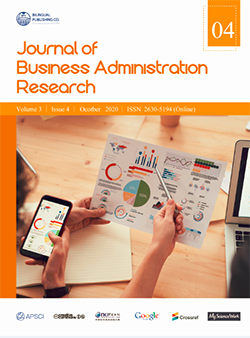Research on Public Participation in Public Procurement: In the Context of Digital Economy
DOI:
https://doi.org/10.30564/jbar.v3i4.2578Abstract
Public participation in public procurement is an important guarantee for its sustainable and healthy operation. In the era of digital economy and big data, public participation in information disclosure, service quality, and service pricing in public procurement plays an important role. Public private partnerships are an innovative form of public procurement. This study sorts out the issues of public participation in PPP projects, and puts forward several suggestions based on data thinking. In terms of public procurement project information disclosure, big data technology is used to improve the timeliness and breadth of information disclosure, and enhance the professionalism of information disclosure. Performance-oriented public procurement focuses on service quality, and guarantees service security through information platforms and professional third parties. The stakeholders use big data to supervise social organizations, so that they actively represent the public to file lawsuits in public procurement and relieve the public’s damaged rights and interests. The protection of the public’s right to know, suggest and supervise is inseparable from the training of professional talents by universities. Colleges and universities attach great importance to the cultivation of big data-oriented public procurement professionals, which includes improving teachers’ teaching ability, building a new knowledge system that combines big data and public procurement, and setting professional courses for students at different learning stages through connotative development.
Keywords:
Pubic Procurement, Digital economy, Pubic participation, Public-Private partnerships, Data thinkingReferences
[1] Ting A, Gray S J. The rise of the digital economy: Rethinking the taxation of multinational enterprises[J]. Journal of International Business Studies, 2019.
[2] Linton O, Todorov V, Zhang Z. Editorial for the special issue on financial econometrics in the age of the digital economy[J]. Journal of Econometrics, 2020.
[3] A Z Y, A X G, A P G, et al. What Drives Entrepreneurship in Digital Economy? Evidence from China[J]. Economic Modelling, 2019, 82: 66-73.
[4] Stéphane Saussier, Jean Tirole. Strengthening the Efficiency of Public Procurement[J]. French Council of Economic Analysis, 2015(4): 5.
[5] United Nations Economic Commission for Europe. Guidebook on promoting good governance in public private partnerships[M]. United Nations Publications, 2008, 13.
[6] OECD. OECD Principles for Private Sector Participation in Infrastructure, 2007: 24.
[7] Rowe, Gene, Frewer, et al. Public Participation Methods: A Framework for Evaluation[J]. Science, Technology & Human Values, 2000.
[8] Council N. Public Participation in Environmental Assessment and Decision Making[J]. 2008.
[9] Fu Y, Ma W. Sustainable Urban Community Development: A Case Study from the Perspective of Self-Governance and Public Participation[J]. Sustainability, 2020, 12.
[10] Jo S, Nabatchi T. Different Processes, Different Outcomes? Assessing the Individual level Impacts of Public Participation[J]. Public Administration Review, 2020.
[11] Macq H, Tancoigne L, Strasser B J. From Deliberation to Production: Public Participation in Science and Technology Policies of the European Commission (1998-2019)[J]. Minerva, 2020(3).
[12] Mang Z. Legal Position of Public Participation - Taking the Case of Urban Environmental System as the Object of Investigation[J]. Administrative Law Review, 2019.
[13] Darrin Grimsey. Mervyn K. Lewis. Public Private Partnerships: The Worldwide Revolution in Infrastructure Provision and Project Finance[M]. Cheltenham Edward Elgar Pub, 2004: 248-249.
[14] K Vaidya, ASM Sajeev, G Callender. Critical factors that influence e-procurement implementation success in the public sector[J]. Journal of public procurement, 2006.
[15] Nik Ab Halim Nik Abdullah. The role of technology attributes, trust and dependency on e-procuremnt adoptions: an empirical analysis of Malaysian manufacturers[M]. University of Southern Queensland, 2009.
[16] Ankersmit L. The contribution of EU public procurement law to corporate social responsibility[J]. European Law Journal, 2020.
[17] Blind K, Pohlisch J, Rainville A. Innovation and standardization as drivers of companies’ success in public procurement: an empirical analysis[J]. The Journal of Technology Transfer, 2020: 1-30.
[18] Moye-Holz D, Dijk J P V, Reijneveld S A, et al. The Impact of Price Negotiations on Public Procurement Prices and Access to 8 Innovative Cancer Medicines in a Middle-Income Country-The Case of Mexico[J]. Value in Health, 2019, 20: 129-135.
[19] Arnstein Sherry R. A Ladder of Citizen Participation[J]. Journal of the American Institution of Planners, 1969, 35(4): 217.
[20] Kochanova A, Hasnain Z, Larson B. Does E-Government Improve Government Capacity? Evidence from Tax Compliance Costs, Tax Revenue, and Public Procurement Competitiveness[J]. World Bank Economic Review, 2020, 34.
Downloads
Issue
Article Type
License
Copyright and Licensing
The authors shall retain the copyright of their work but allow the Publisher to publish, copy, distribute, and convey the work.
Journal of Business Administration Research publishes accepted manuscripts under Creative Commons Attribution-NonCommercial 4.0 International License (CC BY-NC 4.0). Authors who submit their papers for publication by Journal of Business Administration Research agree to have the CC BY-NC 4.0 license applied to their work, and that anyone is allowed to reuse the article or part of it free of charge for non-commercial use. As long as you follow the license terms and original source is properly cited, anyone may copy, redistribute the material in any medium or format, remix, transform, and build upon the material.
License Policy for Reuse of Third-Party Materials
If a manuscript submitted to the journal contains the materials which are held in copyright by a third-party, authors are responsible for obtaining permissions from the copyright holder to reuse or republish any previously published figures, illustrations, charts, tables, photographs, and text excerpts, etc. When submitting a manuscript, official written proof of permission must be provided and clearly stated in the cover letter.
The editorial office of the journal has the right to reject/retract articles that reuse third-party materials without permission.
Journal Policies on Data Sharing
We encourage authors to share articles published in our journal to other data platforms, but only if it is noted that it has been published in this journal.




 Jiangyu Huang
Jiangyu Huang

